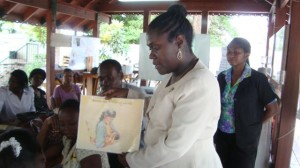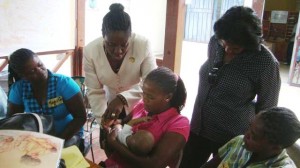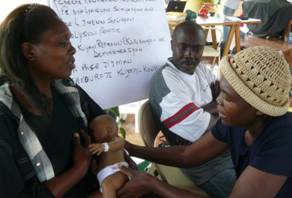Supporting mothers to breastfeed and nourish their children is helping Rose Mireille Exumé, IYCN’s Haiti Country Coordinator, cope with the aftermath of the January 12 earthquake. She finds comfort in knowing that families can improve nutrition for their children despite the adverse conditions they face.

Rose Mireille Exumé, IYCN Haiti Country Coordinator, leads an infant feeding training workshop for baby tent counselors from Project Concern on March 10, 2010.
“I am grateful that I can continue to assist mothers and babies with good nutrition under these difficult circumstances. I have hope that we can prevent malnutrition for many children,” said Rose Mireille.
Together with UNICEF and other partners, Rose Mireille is training emergency health workers to provide vital infant feeding counseling for new mothers as they strive to keep their babies healthy after the earthquake. The trained counselors offer support for mothers in baby tents located in refugee camps across the country, where more than a million people reside in makeshift living spaces made of sheet steel, plastic, or tarps. The baby tents are a safe and welcoming place for mothers to escape the stress of the camps and receive psychosocial support, health care, and infant and young child feeding counselling.

IYCN's Rose Mireille Exumé leads three counselors in a role play activity to discuss good attachment.
By helping to facilitate training workshops for nurses and other health workers from organizations like Save the Children, Action Against Hunger, and Project Concern International, Rose Mireille ensures that counsellors in the baby tents have the knowledge and skills they need to overcome barriers and challenges to good infant feeding after an emergency. Dispelling harmful misconceptions about breastfeeding is one of the greatest challenges for health workers, according to Rose Mireille. Although exclusive breastfeeding during the first six months of life protects against illness and improves survival during emergencies, many mothers believe that their milk is tainted or limited as a result of the stress they have endured, she said.
During training workshops, Rose Mireille skilfully leads participants, like Solange Pierre and Edwine Charles, in practicing counselling skills, facilitating small group discussions, and demonstrating good breastfeeding techniques to help mothers overcome misconceptions and gain confidence in their ability to feed their children. Solange and Edwine—both nurses who have already received nutrition training—said the training from IYCN has increased their knowledge of infant feeding during emergency situations and improved their counselling skills.
“With this training, I am better able to counsel mothers,” said Solange.

In this roleplay, a father doesn't want his wife to breastfeed and a community health worker shares the benefits of breastfeeding.
Rose Mireille has already trained more than 200 health workers in Port au Prince, Leogane, and Jacmel to meet the demand for more skilled counselors in baby tents, mobile clinics, and other locations. She is continuing to respond to requests for technical assistance to help a wide range of organizations offer appropriate infant feeding training for their workers.
As she continues to lead IYCN’s efforts to prevent malnutrition in Haiti, Rose Mireille also tends to the safety and well-being of her own family. She is thankful that her entire family, including her seven children, survived the disaster. Although their house has some cracks, they were able to stay in their home—sharing tents in their front yard with friends in need of shelter. While most of her children still wait for schools to re-open, she has encouraged them to volunteer in the camps to help other families who are not as fortunate.
“Focusing on helping others is helping us get through this,” said Rose Mireille.
Learn more about IYCN activities in Haiti.
Date: Apr 7, 2010 | Category: Success stories
